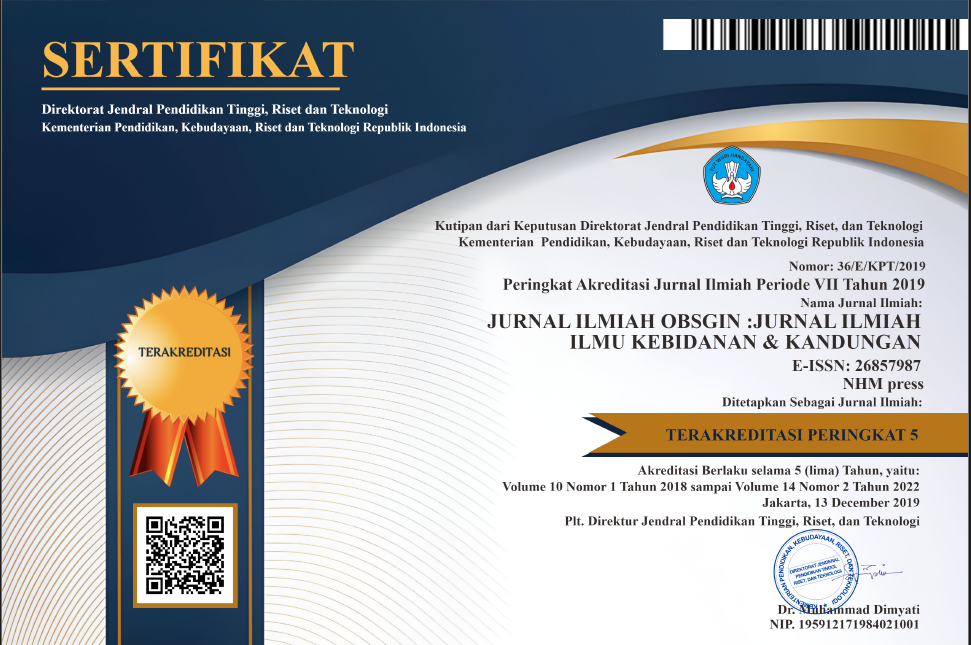HUBUNGAN PENGGUNAAN ALAT KONTRASEPSI SUNTIK 3 BULAN TERHADAP KECUKUPAN ASI DI PRAKTEK MANDIRI BIDAN D DI BOJONG GEDE BOGOR
Abstract
Most children in Indonesia are breastfed continuously until the first year, about half of children aged under 2 months receive exclusive breastfeeding, 41.5% of infants aged 0-6 months are given exclusive breastfeeding. The presentation of exclusive breastfeeding continued to decline after the first 2 months. This study aims to determine the relationship between the use of contraceptives for 3 months on the adequacy of breastfeeding in the Independent Practice of Midwife D Bojong Gede Bogor. Using total sampling. The population in this study were breastfeeding mothers who used family planning for 3 months and those who used family planning other than injections for 3 months who visited Peraktek Mandiri Midwife D Bojong Gede Bogor A total of 50 respondents. Data analysis using survey technique (descriptive survey) with cross sectional approach with chi-quare test. There is a relationship between the use of 3-month injectable contraceptives on the adequacy of breastfeeding at PMB midwife D, in Bojong Gede Bogor in 2022. P-value = 0.000. Which means that this value is p < (0.05) thus it can be concluded that Ha is accepted. This means that there is a relationship between the use of 3-month injectable contraceptives and the adequacy of breastfeeding in the independent practice of midwife D Bojong Gede Bogor
References
Bingan, E. C. S. (2019). Pemakaian KB Suntik 3 Bulan dengan Kecukupan ASI Eksklusif pada Ibu yang Mempunyai Anak Usia 7-23 Bulan. JIDAN (Jurnal Ilmiah Bidan), 6(2), 65–70.
Dewi, A. D. C. (2019). Faktor-faktor yang mempengaruhi kelancaran produksi ASI. Jurnal’Aisyiyah Medika, 4.
Halimahtussadiah, H., Susilawati, E., & Herinawati, H. (2021). Faktor-Faktor yang Berhubungan dengan Pemilihan IUD Pasca Persalinan Muaro Jambi. Nursing Care and Health Technology Journal (NCHAT), 1(3), 162–170.
Husna, A., & Rahmi, N. (2020). Hubungan Penggunaan Kontrasepsi Progestin (Pil) Pada Ibu Menyusui Dengan Kecukupan Produksi ASI di Wilayah Kerja Puskesmas Indrapuri Aceh Besar. Journal of Healthcare Technology and Medicine, 6(2), 1210–1220.
Kemenkes RI. (2018). Hasil utama RISKESDAS 2018. In Kementerian Kesehatan Badan Penelitian dan Pengembangan Kesehatan. https://kesmas.kemkes.go.id/assets/upload/dir_519d41d8cd98f00/files/Hasil-riskesdas-2018_1274.pdf
Kementerian Kesehatan. (2021). Profil Kesehatan Indonesia. Depkes RI. https://pusdatin.kemkes.go.id/resources/download/pusdatin/profil-kesehatan-indonesia/Profil-Kesehatan-indonesia-2019.pdf
Kusnan, A., & Afrini, I. M. (2019). Penggunaan Kontrasepsi Hormonal dan Produksi Air Susu Ibu di Puskesmas Poasia. Jurnal Penelitian Kesehatan" SUARA FORIKES"(Journal of Health Research" Forikes Voice"), 11(1), 91–96.
Montolau, A., Wilopo, S. A., & Prawitasan, S. (2013). Pengaruh Kontrasepsi Hormonal dan Non Hormonalterhadap Lamanya Menyusui di Indonesia (Analisis Data SDKI Tahun 2007). JIDAN (Jurnal Ilmiah Bidan), 1(1), 1–15.
Pujiastuti, N. (2010). Korelasi antara status gizi ibu menyusui dengan kecukupan asi di posyandu desa karang kedawang kecamatan sooko kabupaten mojokerto. Jurnal Keperawatan, 1(2).
Putri, F., Katmawanti, S., & Fanani, E. (2022). Hubungan penggunaan KB dengan pemberian ASI eksklusif di Indonesia (Analisis data SDKI tahun 2017). Sport Science and Health, 4(1), 12–23.
Rayhana, S., & Sufriani, S. (2017). Faktor-faktor yang mempengaruhi produksi ASI dengan Kecukupan ASI. Aceh: Fakultas Keperawatan, Universitas Syiah Kuala Banda Aceh.
Yuliasari, D. (2015). Hubungan penggunaan KB pil kombinasi dengan produksi ASI pada ibu menyusui di Puskesmas Bernung Kabupaten Pesawaran tahun 2014. Holistik Jurnal Kesehatan, 9(4).











